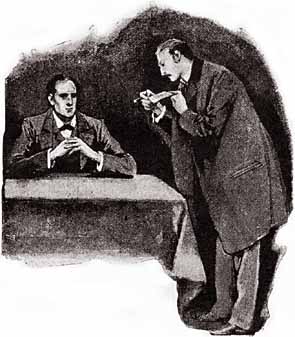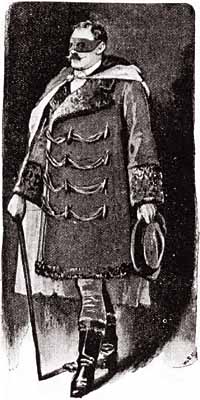“I have no data yet. It is a capital mistake to theorize before one has data. Insensibly one begins to twist facts to suit theories, instead of theories to suit facts. But the note itself. What do you deduce from it?” | 「まだデータがない◆データがないときに理論を組み立てるのは重大な誤りだ◆気が付かないうちに事実を理論に合うようにゆがめてしまう / 事実に合うように理論を組み立てる代わりに◆しかしその便箋自体は別だ◆君はそこからどう推論を導くかね?」 |
I carefully examined the writing, and the paper upon which it was written. | 私は慎重に筆跡を調べた / そしてそれが書かれている紙を |
 | |
“The man who wrote it was presumably well to do,” I remarked, endeavouring to imitate my companion’s processes. “Such paper could not be bought under half a crown a packet. It is peculiarly strong and stiff.” | 「これを書いた男は金回りが良い」 / 私は言った / ホームズの手法を真似ようと頑張って◆「一冊半クラウン以下ではこんな紙は買えない◆妙に強くてごわごわしている」 |
“Peculiar – that is the very word,” said Holmes. “It is not an English paper at all. Hold it up to the light.” | 「妙な - まさしくそれだ」 / ホームズは言った◆「それはイギリスの紙ではない◆光にかざしてみたまえ」 |
I did so, and saw a large “E” with a small “g,”a “P, ” and a large “G” with a small “t” woven into the texture of the paper. | 私は言われたようにした / そして大文字のEと小文字のgとP / 大文字のGと小文字のt / 紙に透かしとして描かれていた |
“What do you make of that?” asked Holmes. | 「それをどう判断する?」 / ホームズは言った |
“The name of the maker, no doubt; or his monogram, rather.” | 「メーカーの名前か / おそらく / 男のイニシャルか、たぶん」 |
“Not at all. The ‘G’ with the small ‘t’ stands for ‘Gesellschaft,’ which is the German for ‘Company.’ It is a customary contraction like our ‘Co.’ ‘P,’ of course, stands for ‘Papier.’ Now for the ‘Eg.’ Let us glance at our Continental Gazetteer.” He took down a heavy brown volume from his shelves. “Eglow, Eglonitz – here we are, Egria. It is in a German-speaking country–in Bohemia, not far from Carlsbad. ‘Remarkable as being the scene of the death of Wallenstein, and for its numerous glass-factories and paper-mills.’ Ha, ha, my boy, what do you make of that?” His eyes sparkled, and he sent up a great blue triumphant cloud from his cigarette. | 「全然違う◆Gと小文字のtはGesellschaftの略語 / ドイツ語で「会社」だ / 慣習的な短縮で英語の Co. のようなものだ / Pはもろん / Papier(紙)の意味だ / さて Eg だが / ヨーロッパ地名辞典をちょっと見てみよう」 / 彼は本棚から分厚い茶色の本を取り出した◆「Eglow, / Eglonitz / / これだ / Egria◆ボヘミアのドイツ語圏の地方だ / カールズバッドからそう遠くない◆ウォーレンスタインが死んだ場所として有名 / 沢山のガラス会社と製紙工場がある場所としても / ハ、ハ、どうだ / これをどう思う」 / 彼の目は輝いた / そして、タバコから派手な青い勝利の煙を吹き出した |
“The paper was made in Bohemia,” I said. | 「その紙はボヘミアで作られた」 / 私は言った |
“Precisely. And the man who wrote the note is a German. Do you note the peculiar construction of the sentence – ‘This account of you we have from all quarters received.’ A Frenchman or Russian could not have written that. It is the German who is so uncourteous to his verbs. It only remains, therefore, to discover what is wanted by this German who writes upon Bohemian paper and prefers wearing a mask to showing his face. And here he comes, if I am not mistaken, to resolve all our doubts.” | 「その通り◆そしてその手紙を書いたのはドイツ人だ◆君は気付いたか、文章の奇妙な構成を / / 『この貴殿の評判はあらゆる方面から受け取っている』 / フランス人やロシア人はこうは書けない◆動詞をこんなに冷遇するのはドイツ人だ◆残るのは、したがって / このドイツ人が何を望んでいるかを見つけること / ボヘミアの紙に手紙を書いて / 顔をマスクで隠したがる◆ああ彼が来た / もし僕が間違っていなければ / すべての疑問を解決するために」 |
As he spoke there was the sharp sound of horses’ hoofs and grating wheels against the curb, followed by a sharp pull at the bell. Holmes whistled. | 彼が話していると、馬の蹄の鋭い音がした / そして車輪が縁石に当たってきしむ音が / それに続いてベルを鋭く引く音が◆ホームズは口笛を鳴らした |
“A pair, by the sound,” said he. “Yes,” he continued, glancing out of the window. “A nice little brougham and a pair of beauties. A hundred and fifty guineas apiece. There’s money in this case, Watson, if there is nothing else.” | 「二頭立てだな / あの音からすると」 / 彼は言った◆「当たりか」 / 彼は続けた / 窓から外を眺めながら◆「立派な小型の四輪馬車に見事な馬が二頭か◆一頭150ギニーはするな◆この件には金はあるな / ワトソン / 他には何もないとしても」 |
“I think that I had better go, Holmes.” | 「私は出て行かないとまずいと思うが、ホームズ」 |
“Not a bit, Doctor. Stay where you are. I am lost without my Boswell. And this promises to be interesting. It would be a pity to miss it.” | 「いや、全然構わない / ワトソン◆そこにいてくれ◆僕の伝記作家がいないと困る◆それにこれは間違いなく面白くなりそうだ◆見逃すと残念なことになるかもしれないよ」 |
“But your client– –” | 「しかし、依頼主が」 |
“Never mind him. I may want your help, and so may he. Here he comes. Sit down in that armchair, Doctor, and give us your best attention.” | 「依頼主は気にしなくていい◆僕が君の助けを必要とするかもしれないのだから / 依頼主も同じはずだ◆さあ来た◆その肘掛け椅子に座って / 先生 / 良く注意を払っていてくれ」 |
A slow and heavy step, which had been heard upon the stairs and in the passage, paused immediately outside the door. Then there was a loud and authoritative tap. | ゆっくりとした重い足取り / それが階段と廊下で聞こえ / ドアのすぐ外で止まり◆それから大きなもったいぶったノックが聞こえた |
“Come in!” said Holmes. | 「どうぞ」 / ホームズが言った |
A man entered who could hardly have been less than six feet six inches in height, with the chest and limbs of a Hercules. His dress was rich with a richness which would, in England, be looked upon as akin to bad taste. Heavy bands of astrakhan were slashed across the sleeves and fronts of his double-breasted coat, while the deep blue cloak which was thrown over his shoulders was lined with flame-coloured silk and secured at the neck with a brooch which consisted of a single flaming beryl. Boots which extended halfway up his calves, and which were trimmed at the tops with rich brown fur, completed the impression of barbaric opulence which was suggested by his whole appearance. He carried a broad-brimmed hat in his hand, while he wore across the upper part of his face, extending down past the cheekbones, a black vizard mask, which he had apparently adjusted that very moment, for his hand was still raised to it as he entered. From the lower part of the face he appeared to be a man of strong character, with a thick, hanging lip, and a long, straight chin suggestive of resolution pushed to the length of obstinacy. | 男が入ってきた / 背丈は6フィート6インチは下らない / 胸と手足はヘラクレスのようにたくましく◆彼の服装は贅沢だった / その贅沢さはもしかすると / イギリスでは / 悪趣味に通じると見られる◆アストラカン毛皮の幅広の帯が袖口と / 彼のダブルのコートの前面と / 一方、濃い青の袖なしマント / それは肩に跳ね上げられていて / 朱絹の裏地になっており / 首のところに留められていた / ギラギラしたエメラルドが付いたブローチで◆ふくらはぎ途中まであるブーツは / 上等な褐色の毛皮で上部が縁取りされており / 印象を完成させていた / 服装全体から漂う粗野な裕福さという◆彼は広いツバの帽子を手に持っていた / 彼は身に付けていた / 顔の上部から / 頬骨を越えて下まで / 黒い覆面を / それは明らかに今整えられたものだ / 彼が入ってきたとき片手はまだ挙げられていたので◆顔の下部は / 強い個性を現しているように見える / 分厚い引き締められた唇 / 長いまっすぐの下顎は / 頑固さまで行き着くような強固な意志を現していた |
 | |
“You had my note?” he asked with a deep harsh voice and a strongly marked German accent. “I told you that I would call.” He looked from one to the other of us, as if uncertain which to address. | 「私の手紙を受け取ったかね」 / 彼は強いドイツなまりの耳障りな声で尋ねた◆「私が来るということは言ってあったが」 / 彼は我々を順に見た / どちらに言ってよいか分からないように |